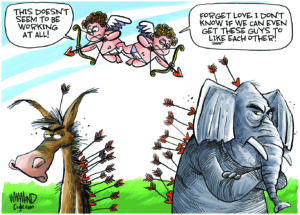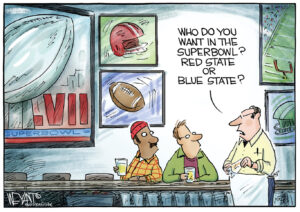Marie Cocco: Saving Their Seats, and Maybe the Country
Congressional Republicans have an opportunity to be both pragmatic and idealistic by abandoning the president on the war.WASHINGTON — The state of our union is stunned disbelief.
The condition was best expressed by one of the anonymous citizens in the jury pool assembled for the trial in the Valerie Plame caper. This is the soap opera that revolves around the Bush administration’s leak of CIA operative Plame’s identity for the purpose of discrediting her husband, who had publicly discredited key intelligence that supposedly pointed to a dangerous Iraqi nuclear program that in fact did not exist.
“I am completely without objectivity,” one woman offered when asked if she could fairly hear testimony from Bush administration figures.” There is nothing they could say or do that would make me think anything positive.”
Of course this jury pool (the woman was immediately dismissed) is in the District of Columbia, a Democratic redoubt where disdain for President Bush runs so deep that its voters cast only 9 percent of their ballots for him in 2004. But things are hardly better in the heartland.
The public has grown antagonistic toward Bush. Disapproval approaches levels once reserved for Richard Nixon during Watergate, and for Harry Truman when he was in the depths of the Korean crisis. By a 2-to-1 margin, Americans say they want Democrats to have more control over the nation’s direction than Bush. Were Newt Gingrich still the political peacock he was in the heady Republican era that began in 1994, he might be tempted to declare — as he did about Bill Clinton — that the president of the United States is irrelevant.
But he is not. The truest and most tragic measure of Bush’s continued power is the arrival in Iraq of more American troops, sent into the teeth of a beastly civil war. By defying the considered, bipartisan advice of the Iraq Study Group; by ignoring the results of the November election, in which voters demanded a change of course; by challenging Congress to a constitutional showdown over war-making powers, Bush has all but declared the voters to be irrelevant.
It is much more shocking than Gingrich’s preening, and so much more dangerous.
The earnest hope for change is symbolized by the start of the 2008 presidential race, with Illinois Sen. Barack Obama poised to become the first African-American to put himself in serious contention for the Oval Office, and the entry of New York Sen. Hillary Rodham Clinton, the only woman in history to have a genuine chance to become president. There is palpable drama and energy in these developments, manifestations of a deep yearning for something new. You want, right now, to move quickly on to this new political terrain — but we can’t.
There is no early out from the Bush presidency. The immediate challenge is to find a way not just to muddle through but to begin repairing the damage.
The new Democratic leadership of the House, with its much-ridiculed “100 hours” agenda that brought quick passage of popular measures to raise the minimum wage, to change the Medicare drug benefit in a bid to lower prices, and to redirect misguided tax giveaways to the oil and gas industries, is off to a more auspicious start than most of the political class has seen fit to admit. Not because the measures are enough to reorder skewed national priorities — but because Republicans voted for each and every one of them.
The strongest Republican vote, 124 in favor, came on the bill to reduce interest rates on student loans. It’s a veto-proof margin, a count that Senate Republicans should not ignore. The plan to raise the minimum wage drew 82 Republicans in favor.
Republican lawmakers who still are queasy about bucking the White House on the upcoming votes objecting to Bush’s troop escalation in Iraq have to be unglued by the grim measurements of their president’s standing with the public. Voters threw them out of power on Capitol Hill in good part because they were perceived as part of the problem, not part of the solution.
They now have a chance to alter that equation. Since the campaign ended and the governing began, no Democratic leader has demonized Republicans in the way that Gingrich demonized Democrats — blaming the opposition party for all evils short of the common cold. Nor do today’s Democrats claim to be leading an ideological revolution.
The best political reason for Republicans to move away from the president and stand with the public is that this may save their seats. The more patriotic one is that it may help save the country.
Marie Cocco’s e-mail address is mariecocco(at symbol)washpost.com.
Copyright 2007, Washington Post Writers Group
Your support matters…Independent journalism is under threat and overshadowed by heavily funded mainstream media.
You can help level the playing field. Become a member.
Your tax-deductible contribution keeps us digging beneath the headlines to give you thought-provoking, investigative reporting and analysis that unearths what's really happening- without compromise.
Give today to support our courageous, independent journalists.






You need to be a supporter to comment.
There are currently no responses to this article.
Be the first to respond.